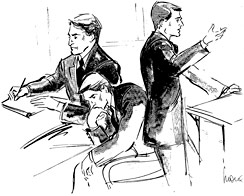People v. Reid 40 N.Y.3d 198 (2023)
New York Court of Appeals
New York Criminal Appeals Lawyer
Appealing a Felony Conviction in New York
Legal Issue
In People v Reid, the Court of Appeals of New York was asked to determine whether the trial court abused its discretion by closing the courtroom to the public and all interested spectators for the last four days of the defendant’s eight-day jury trial. The central question was whether this closure violated the defendant’s Sixth Amendment right to a public trial.
Facts of the Case
Dwight Reid, the appellant, was charged with second-degree murder and two counts of second-degree weapon possession, related to his alleged role in a fatal shooting. During Reid’s jury trial, the prosecution moved to close the courtroom, citing concerns that photographs had been taken in the courtroom and posted on Instagram with the caption “Free Dick Wolf,” which the prosecutor asserted was a reference to one of Reid’s street names.
The trial court noted its concern with the photographs and added that people in the courtroom had been intimidating, including staring down court personnel and intimidating a court reporter. The court decided to close the courtroom entirely, including to the victim’s family, citing the cumulative effect of various factors that created an atmosphere of intimidation during the trial.
Defense counsel objected to the closure and proposed barring cellphones in the courtroom as an alternative. The court rejected this proposal and closed the courtroom for the testimony of several witnesses, summations, and the jury’s verdict. The jury found Reid guilty as charged.
Reid appealed, and the Appellate Division affirmed the trial court’s decision, holding that the closure was a provident exercise of discretion under the extraordinary circumstances presented. A Judge of the Court of Appeals granted Reid’s application for leave to appeal.
Applicable Law
The constitutional right to a public trial is a fundamental privilege of the defendant in a criminal prosecution. The presumption is that trials will be open to the public, and a trial court’s discretion to exclude the public from criminal proceedings must be exercised only when unusual circumstances necessitate it.
In Waller v Georgia, the Supreme Court of the United States set forth criteria for determining when a courtroom may be closed over a defendant’s objection. The party seeking to close the proceedings must advance an overriding interest that is likely to be prejudiced, the closure must be no broader than necessary to protect that interest, the trial court must consider reasonable alternatives to closing the proceeding, and it must make findings adequate to support the closure.
Subsequently, in Presley v Georgia, the Supreme Court emphasized that the particular interest and threat to that interest must be articulated along with findings specific enough that a reviewing court can determine whether the closure order was properly entered.
Court’s Holding
The Court of Appeals concluded that Reid’s Sixth Amendment right to a public trial was violated and he is entitled to a new trial. The court found that the trial court failed to adequately describe the particular acts and circumstances underlying its conclusion that intimidation was occurring, or to identify the specific individuals who had engaged in such intimidation. The record contained no discussion of the purported offenders, no evidence that any witness was actually intimidated, and only vague descriptions of the purportedly intimidating conduct.
The court emphasized that the prevention of intimidation by spectators during trial may very well be an overriding interest that can support courtroom closure. However, it is incumbent on the trial court to ensure that the record adequately justifies its concerns and demonstrates that the identified interest would be jeopardized absent a closure. Where closure is warranted, it must be tailored to address the overriding interest.
The court held that the trial court’s closure was disproportionate in relation to the circumstances described and that the trial court did not sufficiently consider whether less drastic measures could have resolved troubling spectator behavior. The court failed to create a sufficient record to justify a complete closure of the courtroom and, as a result, the closure was not narrowly tailored to the interests sought to be protected.
Accordingly, the order of the Appellate Division was reversed and a new trial was ordered.
Key Terms for Better Understanding
- Sixth Amendment: The amendment to the United States Constitution that guarantees the right to a public trial.
- Appellant: The party who appeals a court decision.
- Instagram: A social media platform where users can share photos and videos.
- Appellate Division: A division of the New York State Supreme Court that hears appeals from lower courts.
- Waller v Georgia: A Supreme Court case that established criteria for courtroom closure.
- Presley v Georgia: A Supreme Court case that emphasized the need for specific findings to support courtroom closure.
- Overriding Interest: A significant interest that justifies courtroom closure.
- Intimidation: Actions that create fear or discomfort among court personnel, witnesses, or jurors.
- Discretion: The authority to make decisions based on one’s judgment.
- Public Trial: A trial that is open to the public, ensuring transparency and fairness.
Criminal Appeals Lawyer in New York
Conclusion
This decision should not be read as suggesting that a courtroom cannever be closed based on the trial court’s observations of intimidation (or other prejudicialbehavior) taking place in the courtroom. Trial courts retain “inherent discretionary power . . .to close the courtroom” (Hinton, 31 NY2d at 75). However, that discretion must be “sparinglyexercised” and invoked “only when unusual circumstances necessitate it” (id. at 76; see MingLi, 91 NY2d at 917).{40 NY3d at 205} When such unusual circumstances occur, it isincumbent on the court to ensure that the record adequately supports excluding members ofthe public.
